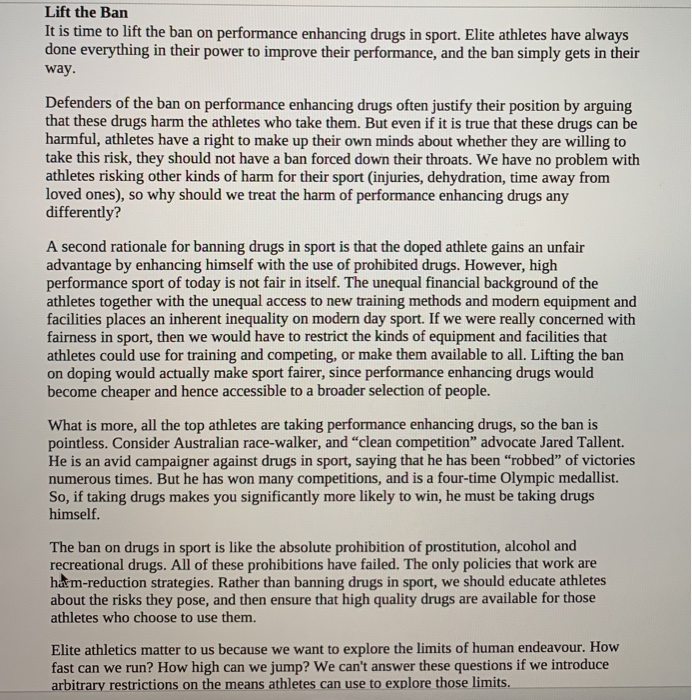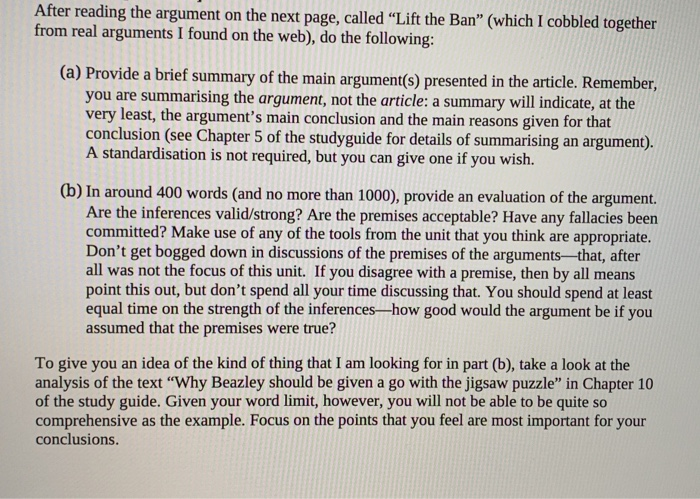Lift the Ban It is time to lift the ban on performance enhancing drugs in sport. Elite athletes have always done everything in their power to improve their performance, and the ban simply gets in their way. Defenders of the ban on performance enhancing drugs often justify their position by arguing that these drugs harm the athletes who take them. But even if it is true that these drugs can be harmful, athletes have a right to make up their own minds about whether they are willing to take this risk, they should not have a ban forced down their throats. We have no problem with athletes risking other kinds of harm for their sport injuries, dehydration, time away from loved ones), so why should we treat the harm of performance enhancing drugs any differently? A second rationale for banning drugs in sport is that the doped athlete gains an unfair advantage by enhancing himself with the use of prohibited drugs. However, high performance sport of today is not fair in itself. The unequal financial background of the athletes together with the unequal access to new training methods and modern equipment and facilities places an inherent inequality on modern day sport. If we were really concerned with fairness in sport, then we would have to restrict the kinds of equipment and facilities that athletes could use for training and competing, or make them available to all. Lifting the ban on doping would actually make sport fairer, since performance enhancing drugs would become cheaper and hence accessible to a broader selection of people. What is more, all the top athletes are taking performance enhancing drugs, so the ban is pointless. Consider Australian race-walker, and clean competition advocate Jared Tallent. He is an avid campaigner against drugs in sport, saying that he has been "robbed" of victories numerous times. But he has won many competitions, and is a four-time Olympic medallist. So, if taking drugs makes you significantly more likely to win, he must be taking drugs himself. The ban on drugs in sport is like the absolute prohibition of prostitution, alcohol and recreational drugs. All of these prohibitions have failed. The only policies that work are ham-reduction strategies. Rather than banning drugs in sport, we should educate athletes about the risks they pose, and then ensure that high quality drugs are available for those athletes who choose to use them. Elite athletics matter to us because we want to explore the limits of human endeavour. How fast can we run? How high can we jump? We can't answer these questions if we introduce arbitrary restrictions on the means athletes can use to explore those limits. After reading the argument on the next page, called Lift the Ban (which I cobbled together from real arguments I found on the web), do the following: (a) Provide a brief summary of the main argument(s) presented in the article. Remember, you are summarising the argument, not the article: a summary will indicate, at the very least, the argument's main conclusion and the main reasons given for that conclusion (see Chapter 5 of the studyguide for details of summarising an argument). A standardisation is not required, but you can give one if you wish. (b) In around 400 words and no more than 1000), provide an evaluation of the argument. Are the inferences valid/strong? Are the premises acceptable? Have any fallacies been committed? Make use of any of the tools from the unit that you think are appropriate. Don't get bogged down in discussions of the premises of the arguments-that, after all was not the focus of this unit. If you disagree with a premise, then by all means point this out, but don't spend all your time discussing that. You should spend at least equal time on the strength of the inferenceshow good would the argument be if you assumed that the premises were true? To give you an idea of the kind of thing that I am looking for in part (b), take a look at the analysis of the text Why Beazley should be given a go with the jigsaw puzzle" in Chapter 10 of the study guide. Given your word limit, however, you will not be able to be quite so comprehensive as the example. Focus on the points that you feel are most important for your conclusions. Lift the Ban It is time to lift the ban on performance enhancing drugs in sport. Elite athletes have always done everything in their power to improve their performance, and the ban simply gets in their way. Defenders of the ban on performance enhancing drugs often justify their position by arguing that these drugs harm the athletes who take them. But even if it is true that these drugs can be harmful, athletes have a right to make up their own minds about whether they are willing to take this risk, they should not have a ban forced down their throats. We have no problem with athletes risking other kinds of harm for their sport injuries, dehydration, time away from loved ones), so why should we treat the harm of performance enhancing drugs any differently? A second rationale for banning drugs in sport is that the doped athlete gains an unfair advantage by enhancing himself with the use of prohibited drugs. However, high performance sport of today is not fair in itself. The unequal financial background of the athletes together with the unequal access to new training methods and modern equipment and facilities places an inherent inequality on modern day sport. If we were really concerned with fairness in sport, then we would have to restrict the kinds of equipment and facilities that athletes could use for training and competing, or make them available to all. Lifting the ban on doping would actually make sport fairer, since performance enhancing drugs would become cheaper and hence accessible to a broader selection of people. What is more, all the top athletes are taking performance enhancing drugs, so the ban is pointless. Consider Australian race-walker, and clean competition advocate Jared Tallent. He is an avid campaigner against drugs in sport, saying that he has been "robbed" of victories numerous times. But he has won many competitions, and is a four-time Olympic medallist. So, if taking drugs makes you significantly more likely to win, he must be taking drugs himself. The ban on drugs in sport is like the absolute prohibition of prostitution, alcohol and recreational drugs. All of these prohibitions have failed. The only policies that work are ham-reduction strategies. Rather than banning drugs in sport, we should educate athletes about the risks they pose, and then ensure that high quality drugs are available for those athletes who choose to use them. Elite athletics matter to us because we want to explore the limits of human endeavour. How fast can we run? How high can we jump? We can't answer these questions if we introduce arbitrary restrictions on the means athletes can use to explore those limits. After reading the argument on the next page, called Lift the Ban (which I cobbled together from real arguments I found on the web), do the following: (a) Provide a brief summary of the main argument(s) presented in the article. Remember, you are summarising the argument, not the article: a summary will indicate, at the very least, the argument's main conclusion and the main reasons given for that conclusion (see Chapter 5 of the studyguide for details of summarising an argument). A standardisation is not required, but you can give one if you wish. (b) In around 400 words and no more than 1000), provide an evaluation of the argument. Are the inferences valid/strong? Are the premises acceptable? Have any fallacies been committed? Make use of any of the tools from the unit that you think are appropriate. Don't get bogged down in discussions of the premises of the arguments-that, after all was not the focus of this unit. If you disagree with a premise, then by all means point this out, but don't spend all your time discussing that. You should spend at least equal time on the strength of the inferenceshow good would the argument be if you assumed that the premises were true? To give you an idea of the kind of thing that I am looking for in part (b), take a look at the analysis of the text Why Beazley should be given a go with the jigsaw puzzle" in Chapter 10 of the study guide. Given your word limit, however, you will not be able to be quite so comprehensive as the example. Focus on the points that you feel are most important for your conclusions








